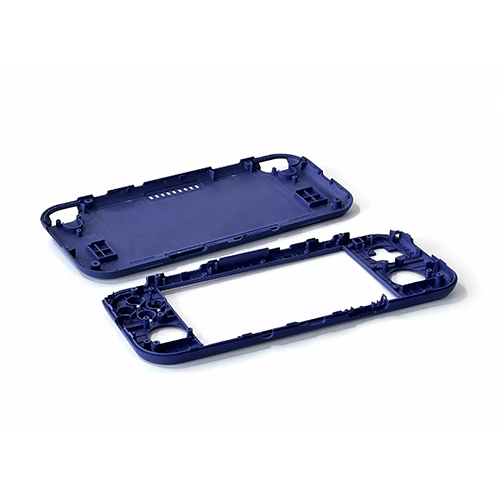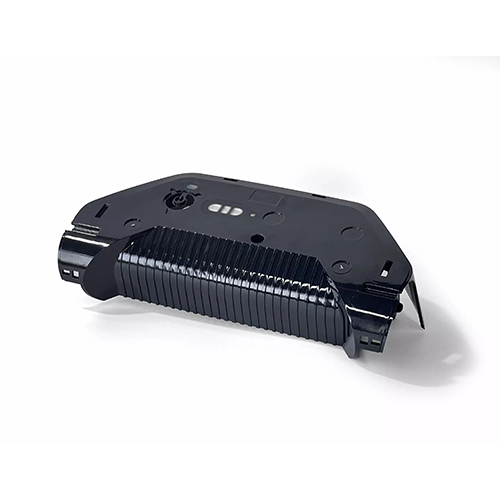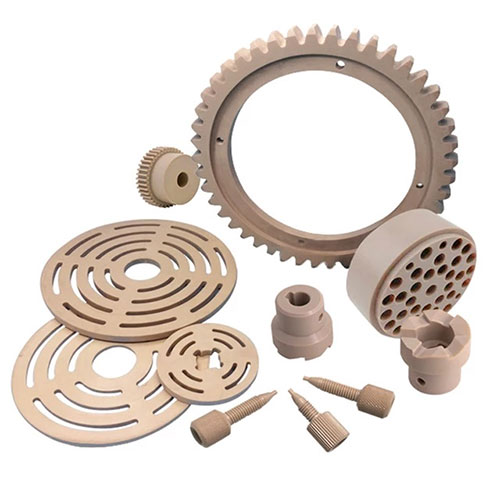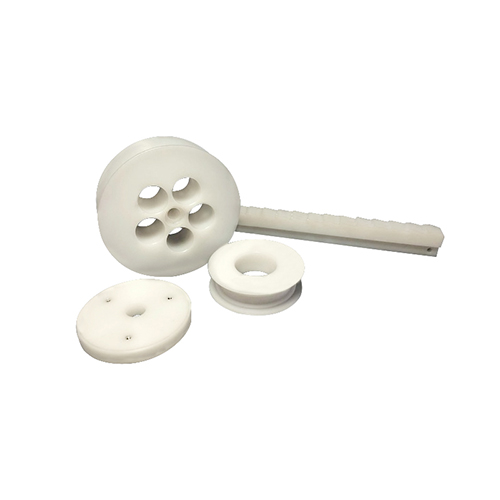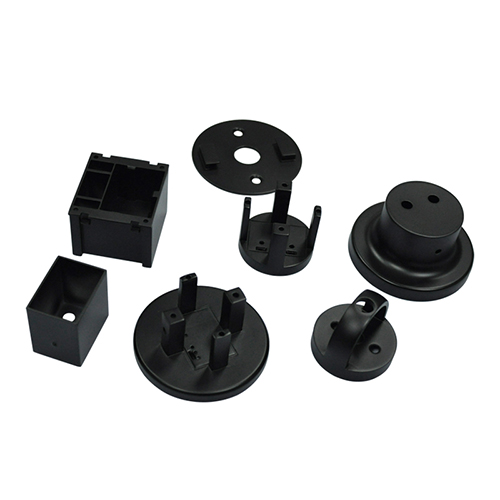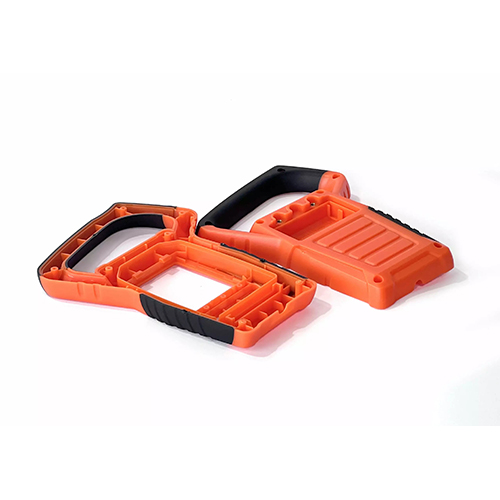ABS
Custom ABS Machining Service
Customized ABS plastic CNC machining solutions for customers at competitive prices, from prototyping to manufacturing, NOBLE uses unparalleled engineering expertise to ensure that you get quality ABS parts and prototypes quickly.
- Advanced Equipment & Cost-Effective Price
- 10+ years of ABS Machining Services
- ISO 9001 & ISO13485 Certified Factory
- Machining Parts As Fast As 2 Days
- Instant ABS Machining Service Quotes
- 24/7 Engineering Support

Our ABS Machining Capabilities
ABS has excellent machinability, affordable price, toughness, and versatility, making it the preferred CNC machining material for prototyping, consumer products, and industrial parts. NOBLE provides customers with reliable customized ABS CNC machining solutions at competitive prices, from prototyping to production, allowing you to obtain excellent appearance, stable performance, and high-precision ABS CNC machined parts quickly.

| Price | $$$ |
| Lead Time | <6 days |
| Wall Thickness | 0.045 in. – 0.140 in. (1.143mm – 3.556mm) |
| Tolerances | +/- 0.003 in. (0.08mm) with an included resin tolerance that can be greater than but no less than +/- 0.002 in./in. (0.002mm/mm) |
| Max Part Size | 18.9 in. x 29.6 in. x 8 in. (480mm x 751mm x 203mm) |
| Available ABS at NOBLE | Polylac PA-746, Polylac PA-765, Cycolac MG47, Lustran 433, Lustran PG298, Lustran 348, RTP 605 (30% GF) |
Characteristics of ABS Machining Materials
ABS is a versatile material with good processing characteristics for injection molding, extrusion, thermoforming, and machining. CNC machining is a precise and efficient method for machining ABS plastics. ABS CNC machining has many advantages, including high precision, easy processing, and versatility. It has good processing characteristics for injection molding, extrusion, thermoforming, and machining. Due to its unique properties, ABS materials are widely used in industries such as automobiles, electronics, telecommunication, and construction, especially for parts that require impact resistance, aesthetics,s and efficient production.
| Features | Info |
| Subtypes | General Purpose ABS, ABS + PC (Polycarbonate), Flame Retardant ABS, Conductive ABS, High-Impact ABS |
| Process | CNC Milling, CNC turning, laser cutting, injection molding, drilling and tapping |
| Tolerance | +/- 0.003 in. (0.08mm) with an included resin tolerance that can be greater than but no less than +/- 0.002 in./in. (0.002mm/mm) |
| Applications | Automotive Parts, Electronics, Industrial Equipment, Medical Devices |
| Finishing Options | Polishing, Painting, Chrome Plating, Laser Etching, Surface Coatings, |
Pros and Cons of ABS for CNC Machining
ABS is a CNC machining material with medium strength, impact resistance, and excellent surface finish that can be precisely cut, injection molded, and finished to form complex geometry parts and intricate prototypes. The good processing characteristics of this ABS material, coupled with its ability to provide a high-quality surface finish, make it an ideal choice for prototyping and small to medium-volume CNC machining. However, its sensitivity to heat, limited chemical resistance, and lower performance in hot or cold environments may limit its use in certain applications. Proper CNC machining techniques are essential to optimize the performance of ABS in CNC machining. Despite these challenges, ABS remains an efficient and cost-effective material that can be used for a variety of precision machining tasks.
Ease of Machining
ABS is relatively easy to machine, allowing for precise cuts and detailed designs. Its low melting point and good flow characteristics enable faster machining and reduce tool wear, making it a popular choice for CNC machining in various industries.
Good Bonding Properties
ABS can be bonded using a variety of methods, including solvent welding, adhesives, or ultrasonic welding, allowing for the creation of complex assemblie.
Excellent Surface Finish
Smooth and Clean Edges: ABS offers a smooth surface finish that can be easily polished or painted. Its clean edges after CNC machining are ideal for applications that require good aesthetic qualities, like product enclosures or consumer goods.
Good Strength-to-Weight Ratio
ABS offers a high strength-to-weight ratio, providing durability and toughness without adding unnecessary weight. This makes it ideal for applications like automotive interior components, consumer electronics, and lightweight housings, where strength is needed but weight reduction is crucial.
Impact Resistance
ABS is known for its excellent impact resistance, making it a suitable choice for parts that need to withstand mechanical stress or sudden impacts. This property is especially beneficial for products like automotive panels, protective covers, and consumer goods that endure rough handling.
Chemical Resistance
ABS offers good resistance to a wide range of chemicals, including oils, greases, and many cleaning agents. This makes it suitable for parts used in industrial or automotive environments, where exposure to chemicals or solvents may occur.
Aesthetic Flexibility
ABS can be easily polished, painted, or textured, providing versatility in surface finishes. This makes it ideal for both functional and aesthetically demanding parts, such as consumer electronics, medical devices, and automotive components, where appearance is as important as performance.
Ease of Post-machining
Post-machining operations such as sanding, painting, and gluing are relatively straightforward. ABS takes adhesives and coatings well, making it easy to achieve the desired final appearance and functionality.
Good Bonding Properties
ABS can be bonded using a variety of methods, including solvent welding, adhesives, or ultrasonic welding, allowing for the creation of complex assemblies.
Wide Range of Uses
CNC-machined ABS parts can be used in various industries, including automotive, medical devices, consumer electronics, and prototyping. It’s suitable for producing both functional and aesthetic components.
Customizability
ABS can be easily modified with additives (e.g., flame retardants, UV stabilizers) to enhance properties for specific applications, such as increased flame resistance or UV stability.
Low Tool Wear
Since ABS is softer than metals, it causes less wear and tear on cutting tools, leading to longer tool life and less frequent tool changes, thus lowering the overall cost of machining.
Durability
ABS has a strong balance of impact resistance, tensile strength, and toughness. It performs well under moderate mechanical stress, making it suitable for functional parts like housings, brackets, or prototypes.
Lightweight
ABS provides a good strength-to-weight ratio, which is particularly beneficial for applications where weight reduction is important (e.g., automotive or aerospace components).
Cost-Effective
Compared to other engineering plastics and metals, ABS is relatively inexpensive, offering an affordable material option for high-volume production runs. Its cost-effectiveness makes it a popular choice for industries such as automotive, electronics, and consumer goods, without compromising on quality or performance.

Low Heat Resistance
ABS has a relatively low heat resistance compared to other engineering materials like metals or high-performance plastics. It may deform or lose strength in high-temperature environments during CNC machining, limiting its use in applications such as engine parts or industrial machinery exposed to elevated heat.
Surface Defects with Improper Settings
Melt Marks and Streaking: If the machining conditions (cutting speed, feed rate, and cooling) are not optimized, ABS can experience melt marks or streaks on the surface, requiring additional post-processing to fix.
Risk of Material Distortion
If not properly cooled or handled, ABS can distort or lose its shape during the machining process. This makes controlling cutting temperatures and tool speeds crucial for maintaining dimensional accuracy.
Prone to Cracking Under Stress
While ABS is tough, it is still susceptible to cracking or breaking under prolonged exposure to mechanical stress, especially at lower temperatures. This makes ABS unsuitable for applications that involve high load-bearing or extreme stress conditions, such as in heavy-duty machinery or structural components.
UV Degradation
ABS is prone to degradation when exposed to ultraviolet (UV) light over time, leading to discoloration, brittleness, and loss of mechanical properties. For outdoor applications or parts exposed to sunlight, ABS may require UV-resistant coatings to prevent deterioration and ensure long-term performance.
Not Suitable for High-Load Applications
While ABS provides adequate strength for many applications, it may not perform well under high-load or high-stress conditions. It is not the best choice for parts that need to withstand extreme forces or high-pressure environments, such as aerospace components or high-stress mechanical systems.
Limited Biocompatibility
ABS is generally not considered biocompatible for medical implants or devices that come into direct contact with human tissues. Although it can be used in medical equipment like housings or non-invasive tools, ABS requires special treatment or coatings for applications where body interaction is involved.
Environmental Impact
ABS is not biodegradable and, while recyclable, is not as commonly recycled as other plastics. This makes ABS a less environmentally friendly option compared to more sustainable materials. Its disposal can contribute to waste, making it less suitable for eco-conscious applications unless properly managed.
Burr Formation
While ABS typically produces clean cuts, improper tool geometry or excessive feed rates can result in burr formation, which requires additional deburring operations.
Vulnerability to Certain Chemicals
ABS has limited resistance to strong acids, alkalis, and solvents. While it resists oils, fats, and some organic solvents, harsh chemicals can degrade the material, which limits its use in some industrial applications where exposure to chemicals is common.
Surface Degradation
Prolonged exposure to UV light and certain environmental conditions can cause ABS to degrade, leading to discoloration, cracking, or fading over time unless it is modified with UV stabilizers.
Low Recycling Rate
ABS is not as widely recycled as other plastics like PET or HDPE, and recycling ABS can be more complex due to the blending of different monomers. This can lead to a higher environmental impact if disposal is not managed properly.

Types of ABS Machining Materials
ABS is a versatile thermoplastic polymer that is widely used in CNC machining due to its ease of processing, good mechanical properties, and suitability for a wide range of applications. ABS is available in a variety of formulations and grades that can be tailored for specific performance characteristics, making it an ideal material for a variety of CNC machining applications, from prototyping to end-use production. By selecting the appropriate grade or blend of ABS, CNC machining manufacturers can optimize the performance, durability, and cost-effectiveness of the final part, ensuring it meets the functional and aesthetic requirements of a variety of industries, from automotive and electronics to medical and industrial applications. Different types of ABS offer various advantages and can be selected based on the desired physical properties, ease of processing, and environmental conditions. The following is a detailed introduction to common ABS:

Polylac PA-746
Offers outstanding mechanical strength, impact resistance, and dimensional stability, along with excellent processability for achieving high-quality finishes. It is widely used in industries where tough, durable components with precise dimensions are essential, such as automotive, consumer electronics, and electrical housings.
Tensile Strength (ASTM D648): 40.6 MPa
Elongation (ASTM D648): 30%
Hardness (R-Scale) (ASTM D785): 118
Heat Deflection: 179-205℉

Polylac PA-765
This ABS material provides a balanced blend of strength, flexibility, and ease of CNC machining, with good impact resistance and surface quality. This makes it ideal for general-purpose applications, including household appliances and industrial parts, where durability and machinability are required.
Tensile Strength (ASTM D648): 38.1 MPa
Elongation (ASTM D648): 15%
Hardness (R-Scale) (ASTM D785): 100
Heat Deflection: 163-181℉

Cycolac MG47
Cycolac MG47 is a versatile ABS with excellent impact and chemical resistance, as well as superior dimensional stability. It is frequently used in industries like automotive, electrical, and consumer electronics, particularly for components that demand high-quality finishes and Robust performance.
Tensile Strength (ASTM D648): 44.0 MPa
Elongation (ASTM D648): 15%
Hardness (R-Scale) (ASTM D785): 112
Heat Deflection: 176-201℉

Lustran 433
Designed to deliver a high gloss and exceptional surface finish, combined with strong impact resistance and good dimensional stability. Its ease of CNC machining makes it suitable for applications where both appearance and durability are critical, such as automotive interiors and consumer goods.
Tensile Strength (ASTM D648): 42.1 MPa
Elongation (ASTM D648): 30%
Hardness (R-Scale) (ASTM D785): 109
Heat Deflection: 185-211℉

Lustran PG298
Lustran PG298 offers high gloss, impact resistance, and improved processability, making it perfect for CNC machining where both aesthetic quality and toughness are necessary. It is commonly used in automotive, consumer products, and electrical housings, where high-quality surfaces and durability are key.
Tensile Strength (ASTM D648): 40 MPa
Elongation (ASTM D648): 30%
Hardness (R-Scale) (ASTM D785): 110
Heat Deflection: 183-201℉

Lustran 348
Provides excellent impact resistance, stiffness, and surface quality, along with high strength and dimensional stability. It is widely used in demanding applications such as electrical enclosures, consumer electronics, and industrial components, where both mechanical performance and appearance matter.
Tensile Strength (ASTM D648): 48.3 MPa
Elongation (ASTM D648): 25%
Hardness (R-Scale) (ASTM D785): 112
Heat Deflection: 183·198℉

RTP 605 (30% GF)
This is a glass-filled ABS material that incorporates 30% glass fibers, significantly boosting its strength, stiffness, and dimensional stability. Ideal for high-load applications, it is often used in automotive components, industrial machinery, and parts requiring enhanced structural performance and rigidity.
Tensile Strength (ASTM D648): 97 MPa
Elongation (ASTM D648): 1% – 2%
Hardness (R-Scale) (ASTM D785): Not Been Tested
Heat Deflection: 200℉
Surface Finishing Options for ABS Machining
Surface treatment plays a vital role in enhancing the appearance, durability, and functionality of CNC-machined ABS parts. Each technology offers different benefits depending on the application. Based on your needs, we will customize your CNC machining solution to ensure the high precision and competitiveness of your products.

Painting
Painting involves Spray droplets can be dispersed uniformly or in fine amounts to cover a wide surface area and bring out greater color to the part.

Polishing
Working on metal and hard plastics, our polishing uses highly efficient machinery to get our parts between Ra 0.8~Ra0.1 for a cleaner surface.

Sand Blasting
Band blasting cleans the surface of any impurities and peels coating through the propelling of blast media streams over the parts.

Electroplating
Electroplating reduces metal cations in the electrolyte solution, producing a metallic coating on a metal surface. This process can be used for purposes of corrosion and wear resistance, as well as for decorative purposes.

Laser Carving
Helpful in brand recognition or parts organization, we use laser carving that applies various printing methods during full-scale production to quickly embed barcodes, lettering and logos on the parts.

Heat Transfer Printing
Heat Transfer Printing applies heat and pressure to transfer designs onto surfaces, creating durable, vibrant graphics suitable for various materials.
Custom ABS Machining Parts Display
Check out our over ten years of custom ABS machining parts, including precision ABS prototypes and parts from our valued customers.
Applications of ABS CNC Machining
ABS is one of the most commonly used thermoplastic polymers in CNC machining because of its good mechanical properties, ease of machining, and versatility. ABS can be precisely CNC machined into complex geometries, making it an ideal choice for prototyping and small to medium-volume CNC machining. In CNC machining, ABS strikes a balance between strength, impact resistance, and aesthetics, making it suitable for use in a wide range of industries, including automotive, consumer electronics, medical, aerospace, toys, industrial manufacturing, packaging, consumer products, and lighting.

Automotive Parts
ABS is widely used in the automotive industry for CNC machining parts like dashboards, trim pieces, interior panels, and exterior housings. Its excellent impact resistance, dimensional stability, and ability to withstand high temperatures make it an ideal material for durable, lightweight automotive components.

Aerospace Parts
In aerospace applications, ABS is used for producing non-critical components such as cabin interior panels, fixtures, and instrument housings. Its lightweight, strong, and impact-resistant properties are well-suited for parts that require high performance but do not bear direct structural loads in flight.

3D Printing Prototypes
ABS is a popular material for prototyping in 3D printing, especially when functional prototypes are needed for testing form, fit, and function. It offers good dimensional stability and impact resistance, allowing designers to create precise and durable prototypes before full-scale production.

Medical Devices
ABS is a popular material for CNC machining medical devices, including housings for diagnostic equipment, surgical tools, and prosthetic components. Its strength, biocompatibility, and ease of manufacturing allow for precise and safe production of critical healthcare products that meet industry standards.

Consumer Electronics
ABS is commonly CNC machined into enclosures, cases, and housings for consumer electronics such as smartphones, computers, televisions, and gaming consoles. Its high durability, ease of processing, and smooth finish make it perfect for creating aesthetically pleasing and protective enclosures for electronic devices.

Industrial Parts
In industrial settings, ABS is used to manufacture machine components such as valves, housings, brackets, and protective covers. Its resistance to impact, chemicals, and temperature fluctuations makes it an excellent choice for parts that need to endure harsh environments and mechanical stress.
If you are looking for a rapid prototyping manufacturer or a CNC machine shop to fabricate small, medium-volume, or mass-production products, NOBLE is an ideal choice.Our well-trained and experienced staff manufactures parts in line with drawings on modern CNC machines, with the highest accuracy and processing quality in all sizes.In addition, we provide professional design considerations for your CNC machining projects.
Want to get the most professional and fastest service for your CNC machining project? Upload your CAD files now and obtain a quote!

